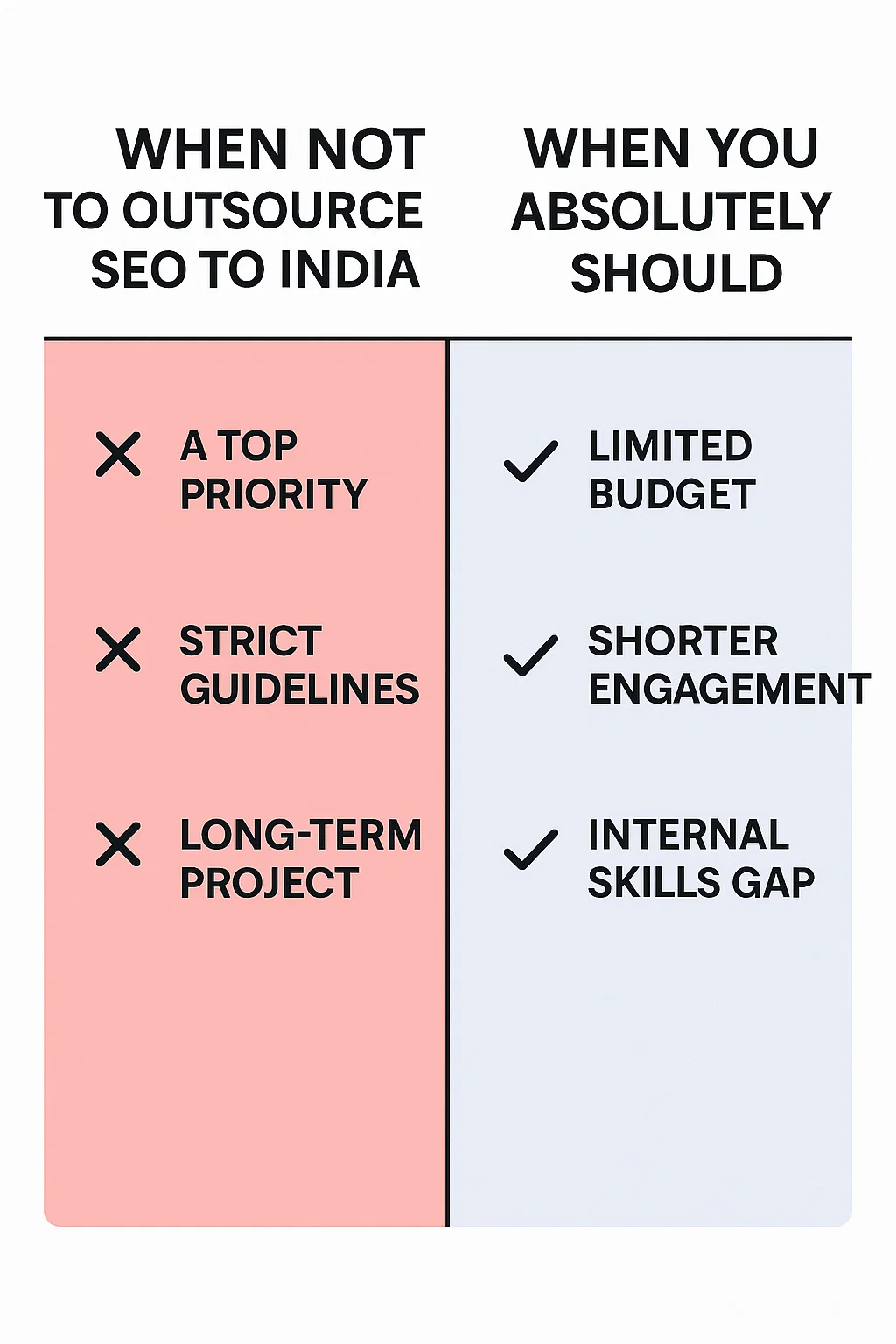In 2025, SEO outsourcing to India is no longer just a cost-saving tactic—it’s a high-performance growth lever used by startups and enterprises alike. Indian agencies offer world-class capabilities in technical SEO, content production, and link building. However, outsourcing isn’t a magic fix. In some cases, handing over SEO to an external partner—especially without the right context—can backfire.
So, when should you not outsource SEO to India? And when is it exactly the right move? Let’s break it down.
When not to outsource SEO to India
1. Your business needs hyper-local, real-time content
If your SEO strategy depends on real-time updates, physical-location optimizations (e.g., local citations, Google Maps), or constant newsroom-style content tied to U.S.-based events, outsourcing may create delays or disconnects.
Better alternative: Use an internal team or a U.S.-based agency with a focus on hyper-local search marketing.
2. You don’t have a clear SEO strategy
Outsourcing execution makes sense after you’ve defined your SEO roadmap. If your brand hasn’t aligned on goals, funnel stages, KPIs, or messaging, hiring an offshore team—even the best SEO agency in India—won’t solve the strategy gap.
Better alternative: Start with an internal workshop or a strategic engagement with an enterprise SEO agency to define the big picture first.
3. You can’t provide timely inputs
SEO outsourcing is collaborative. Even the most capable team in India will need access to your CMS, product roadmap, brand guidelines, and timely approvals. If your internal team is too swamped to respond, results may stall.
Better alternative: Build a lightweight internal process before engaging an external team.
4. Your brand requires high-stakes compliance (e.g., legal, medical, financial)
If your business operates in highly regulated sectors where content must meet strict legal or compliance standards, extra care is needed. While some Indian agencies have this domain expertise, not all do.
Better alternative: Vet SEO partners thoroughly or use a compliance-aware U.S.-based content team.
When you absolutely should outsource SEO to India
✅ When you’ve defined the strategy—but need scalable execution
Indian SEO teams shine when executing complex tasks at scale: keyword clustering, content briefs, technical audits, site migrations, backlink outreach—you name it.
✅ When you want full-service support without high overhead
From ecommerce to SaaS, companies save 40–60% by outsourcing SEO services to India—without compromising quality. The talent pool is deep, and many Indian firms rival Western agencies in output and precision.
✅ When you need multilingual or international SEO
India’s top agencies are experienced in global rollouts—managing Hreflang tags, content localization, and region-specific domain structures. This is crucial for brands expanding across markets.
✅ When your in-house team needs an extension
Many U.S. companies now partner with India-based agencies as dedicated SEO pods—integrated with Slack, Notion, or Asana—delivering tasks just like an internal team, but more efficiently.
What to look for in an Indian SEO partner
Not all agencies are equal. Look for those that:
-
Provide detailed onboarding and planning
-
Align with your tools, cadence, and communication style
-
Share clear SLAs and KPI frameworks
-
Offer transparency in reporting
-
Bring proactive ideas, not just passive execution
This is where firms like Briskon stand out. Briskon is an example of an Indian SEO company that blends execution excellence with enterprise collaboration standards. While every business has unique needs, Briskon’s approach reflects what’s possible when Indian teams are treated as strategic partners—not just task-doers.
Final thoughts
SEO outsourcing India is powerful—but only when used with clarity and purpose. Don’t outsource when you’re still defining your SEO identity or need ultra-local campaigns. But when you’re ready to scale, optimize, or expand globally, Indian SEO firms can accelerate your vision faster than traditional models allow.
It’s not about either/or—it’s about knowing when to outsource, and finding the right partner who can turn strategy into sustainable search performance.









